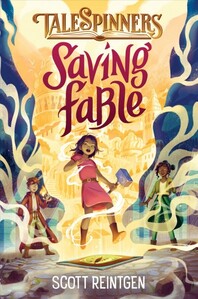
Indira Story has spent her life in the town of Origin, a character-in-waiting who wants nothing more than to be chosen for a story. So when the Author Borealis arrive and Indira is chosen to go to Fable--home to the school which has trained every Protagonist in literary history--it's like a dream come true.
But when Indira arrives at Protagonist Preparatory, she's set on the side character track--a far cry from the hero she's always dreamed of being. She's determined to do her best anyway, and impress her teachers, who are all famous protagonists in their own right from Romeo to Odysseus. If she works hard, Indira is sure she can become a protagonist, too.
Somehow, though, even her best efforts don't seem to be working. She's failing at being just a side character. Indira's future is looking bleak when strange things start happening at Protagonist Preparatory, and she starts putting the pieces together--pieces which someone nefarious is trying very hard to keep hidden.
Will Indira have it in her to be the hero she's always dreamed of--or will she fail, leaving Fable to a disastrous fate?
If any part of the above story description sounds the least bit familiar, or even a little cliché, that's the point. Saving Fable plays on the most stereotypical, most traditional, most familiar tropes and mixes them up with a world populated by characters and full of clever literary puns, and the result is extraordinary. There are many books which play off story elements of heroes and books--some favorites of mine include Finding Serendipity and The Thieving Collectors of Fine Children's Books--but Reintgen pulls it off here with spectacular and outstanding flair, full of brilliant jokes and constant humor which is so incredibly self-aware. The brilliant writing craft references, which essentially make up the whole world of Saving Fable, are particularly notable in my opinion, in part because they are so incredibly brilliant but also because they create such an atmospheric, detailed, and truly hilarious world; whether it's references to famous protagonists, brainstorming, or simply the classic hero-versus-antagonist plot, they never fall flat and made me laugh my way through this whole book.
But part of what makes this book stand out is that you don't have to get all of these jokes to love it--they're more of an undercurrent which makes it even more spectacular. The characters, including Indira, are also awesome, and all seemed to sparkle with something of their own; together with a fully realized world and a bright and even surprising plot, they created a full and complete story which I couldn't put down. I highly recommend Saving Fable to fans of fantasy ages nine and up, particularly those who have read enough books to recognize both the funny and familiar in its story.
Note: If you like Saving Fable, check out our interview with author Scott Reintgen!



 RSS Feed
RSS Feed
